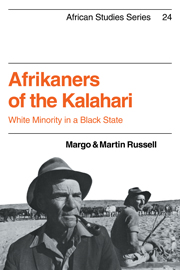Book contents
- Frontmatter
- Contents
- List of illustrations
- Acknowledgements
- A note on terminology
- 1 Southern Africa
- 1 The mundane Kalahari: an introduction
- 2 Boers, trekboers and bywoners: 1898–1930
- 3 Into the cash economy: 1930–72
- 4 Ghanzi Afrikaners 1973: a domestic description
- 5 Preserving boundaries: similarities, ambiguities and avoidances
- 6 Boers and Bushmen: dependence, interdependence and Independence
- 7 Sharing religion: attitudes to the conversion of the Bushmen to Christianity
- 8 Boers, bureaucrats and blacks
- 9 Prospect: whites in a black state
- Notes
- Bibliography
- Index
6 - Boers and Bushmen: dependence, interdependence and Independence
Published online by Cambridge University Press: 04 August 2010
- Frontmatter
- Contents
- List of illustrations
- Acknowledgements
- A note on terminology
- 1 Southern Africa
- 1 The mundane Kalahari: an introduction
- 2 Boers, trekboers and bywoners: 1898–1930
- 3 Into the cash economy: 1930–72
- 4 Ghanzi Afrikaners 1973: a domestic description
- 5 Preserving boundaries: similarities, ambiguities and avoidances
- 6 Boers and Bushmen: dependence, interdependence and Independence
- 7 Sharing religion: attitudes to the conversion of the Bushmen to Christianity
- 8 Boers, bureaucrats and blacks
- 9 Prospect: whites in a black state
- Notes
- Bibliography
- Index
Summary
Boer relationships with Bushmen have been shaped by at least two sets of pressures, economic and political. While the more decisive role of the former cannot be denied, the latter should not be overlooked. It was administrative decision that first granted the boers pastoral rights and eventual freehold over Bushman territory, officially described with typical colonial disregard as ‘Vacant land’, because those who lived there were too unsophisticated even to lay claim to it. Fuller, who led the first party of trekkers to Ghanzi in February 1894, had reported that
the Masarwa Bushmen … appear to be very well disposed towards white people, in fact we have been followed by about thirty or forty of them since we have entered the country and they do not seem inclined to leave us now that we have encamped. I believe the principal reason for them wishing to be near us is that they might be protected from Segkome's people who they accuse of taking their women and children, the skins, feathers etc. that they hunt for and often killing men in addition. It is said that parties of Lake people come down occasionally purposely to get slaves etc. from amongst the Bushmen.
The Afrikaners did not then come, as may be supposed, as the vanguard of a foreign invasion to shatter the idyllic peace of the Bushmen's stone-age society.
- Type
- Chapter
- Information
- Afrikaners of the KalahariWhite Minority in a Black State, pp. 79 - 98Publisher: Cambridge University PressPrint publication year: 1979

